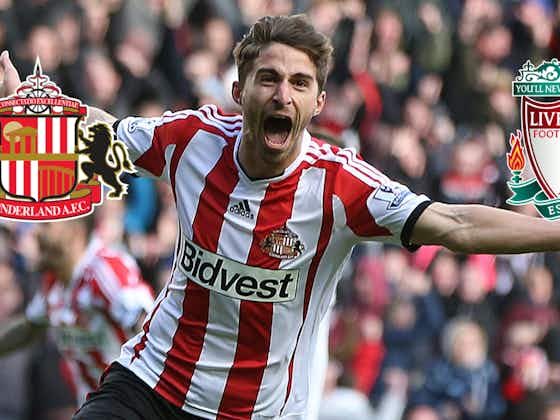Football League World
·18 November 2023
Sunderland's £8m deal with Liverpool reaped early rewards but not for long: View

In partnership with
Yahoo sportsFootball League World
·18 November 2023

footballleagueworld video of the day
The 2013/14 season was certainly an eventful one for those of a Sunderland persuasion.
In the Premier League, the Black Cats pulled off a remarkable run of late-season form to secure an unlikely survival from relegation to the Championship.
Meanwhile, the cup competitions would see the club make it to the quarter-finals of the FA Cup, and go even better in the League Cup, where they made it all the way to the final to secure a trip to Wembley, although they would ultimately miss out on silverware to Manchester City.
Even so, all that will have made for a memorable campaign for supporters of the Black Cats, and one man who played a pivotal role in that period for the club, was Fabio Borini.
On the final day of the 2013 summer transfer window, Borini would join Sunderland on a season-long loan deal from fellow Premier League side Liverpool.
Over the course of the campaign, the attacker would provide some unforgettable, and indeed vital, moments for the Black Cats.
Those included a stunning late winner in the 2-1 victory over Newcastle United in the Tyne-Wear derby, and a nerveless late penalty to claim the win that kick-started Sunderland's run to safety with success over Chelsea at Stamford Bridge, that ended Jose Mourinho's famous unbeaten home Premier League record as the Blues' manager.
In total, Borini would score ten goals in 40 appearances in all competitions for the Black Cats that season, form that saw him named Sunderland's Young Player of the Year for that campaign.
As a result, it was perhaps no surprise to see that the Black Cats would eventually take steps to bring the Italian back to the Stadium of Light on a permanent deal that, ultimately, many will argue, did not go anywhere near as well as his loan one.
After a year back at Liverpool, Borini would return to Sunderland on a permanent basis, in the summer of 2015.
It was reported at the time that the Black Cats paid an initial £8million fee, rising to £10million, to bring the attacker back to the North East, although they seemingly did not get quite the return on that investment, they would have wanted.
In his first season back at the Stadium of Light, Borini did make some useful contributions for the Black Cats, with goals in victory over Norwich and draws with Crystal Palace and Chelsea late in the season, as they again produced a late rally to avoid relegation from the Premier League come the end of the campaign.
However, the following campaign was even more of a struggle both for Sunderland, and Borini himself.
That 2016/17 season saw the attacker manage just two goals in 26 appearances in total for the Black Cats, as he failed to find the form he had previously shown in the red and white stripes.
Without those contributions from the Italian, among others, that had proved so important in recent campaigns, the Black Cats would finally surrender their top-flight status, finishing bottom of the standings, 16 points from safety.
Had the Black Cats been able to pick up the points, and potentially confidence and momentum, from the goals Borini had delivered in previous seasons, then things may well have ended up differently for Sunderland in that season.
As it was, that would prove to be the end of the attacker's Sunderland career, with Borini leaving on loan to AC Milan in the summer of 2017, in a deal that included the option to buy.
Despite an underwhelming campaign in 2017/18 from the attacker, Borini would indeed secure a permanent move to Milan that year.
By contrast, the 2017/18 season saw Sunderland themselves endure a second consecutive relegation to drop into League One, further ushering the club into a period in the wilderness.
Given they are only now starting to look like a side with the potential to secure return to the top-flight of English football, the fact that Sunderland were unable to get the same sort of return on their considerable investment in Borini as they did when he was on loan with the club, looks as though it proved rather costly indeed.






























































